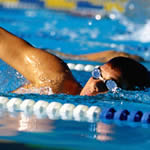 Swimming is a sport in which there is a great diversity among participants. There are both recreational and competitive swimmers, ranging in age from preschool through college.
Swimming is a sport in which there is a great diversity among participants. There are both recreational and competitive swimmers, ranging in age from preschool through college.
Although the lack of impact in swimming makes it a perfect choice for avoiding lower-body injuries, the intense involvement of upper-body muscles makes overuse injuries a real possibility.
The most common swimming-related injury is swimmer’s shoulder, shoulder pain usually caused by rotator cuff tendonitis. Many cases of swimmer’s shoulder can be successfully treated through physical therapy.
For competitive athletes, rotator cuff surgery may be recommended if shoulder pain continues after 6 months of guided rest and rehabilitation.
Signs and Symptoms of Swimmer’s Shoulder
- Shoulder pain while swimming freestyle
- A forward shoulder slouch while seated
- Underdeveloped posterior shoulder musculature
- A mild winging on the affected side’s left scapula
- Tenderness in the acromioclavicular joint and coracoid process in the impingement area
- Tenderness in the affected side’s bicep tendon and supraspinatus tendon
- A full range of motion in all planes
- Strength is slightly decreased in the supraspinatus and infraspinatus
- Full strength in the internal rotators, arm extensors, and flexors
- Moderate posterior and anterior laxity in both shoulders
- A bilateral sulcus sign
- Impingement and adduction-compression tests on the affected side were positive
- An apprehension test on the affected side was negative
Swimming Safety and Injury Prevention
According to Dr. Franklin, “Proper warm up, stretching, technique and conditioning are crucial in preventing tendonitis and overuse injuries in swimmers.”
- Learning proper technique goes a long way toward preventing injuries; if you’re just starting out, schedule some sessions with a swimming coach.
- Remember to warm up and stretch before every swim, giving particular attention to your shoulders.
- A strength-training program can help build up the muscles around the shoulder and upper back; ask a physical therapist or personal trainer if you need help creating a routine.
If you believe you are suffering from swimmer’s shoulder or swimming-related injury and need specialized orthopedic care, the orthopedic surgeons at OSS provide excellent treatment options for your injury. Please feel free to contact OSS at (206) 633-8100 to schedule an appointment.

